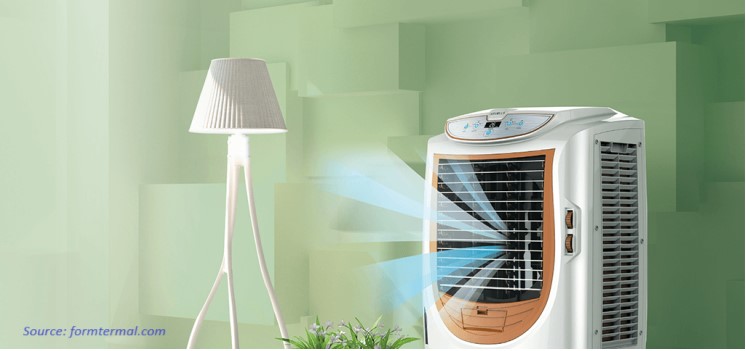
Sweden Heat Exchangers Market by Type (Shell & Tube, Plate & Frame, Air Cooled, and Others), by Material (Metals, Alloys, and Brazing-CLAD), and by End User (Chemical, Energy & Power, Heating, Ventilation, Air Conditioning, and Refrigeration (HVACR), Food & Beverage, Pulp & Paper, and Others)– Opportunity Analysis and Industry Forecast, 2024–2030
Industry: Retail and Consumer | Publish Date: 21-Mar-2024 | No of Pages: 118 | No. of Tables: 86 | No. of Figures: 51 | Format: PDF | Report Code : N/A
Market Overview
The Sweden Heat Exchangers Market size was valued at USD 122.9 million in 2023, and is predicted to reach USD 215.6 million by 2030, with a CAGR of 7.7% from 2024 to 2030.
Heat exchangers, created to transfer heat between fluids without direct contact, find extensive application across industrial, commercial, and residential sectors, including HVAC systems and refrigeration units, for efficient fluid or air heating or cooling. Working by allowing heat to traverse a barrier, such as a solid wall or an array of plates or tubes, they perform tasks including heating water in boilers or cooling air in air conditioning systems.
These devices come in various designs tailored to specific needs, ranging from simple radiator coils to complex systems found in chemical processing plants and power generation facilities. They are vital across multiple industries and applications, regulating air temperature in buildings, facilitating steam production in power plants, controlling temperatures during chemical reactions, and aiding in food processing, among other functions. Additionally, they are indispensable components in automotive cooling systems and find widespread usage in aerospace, marine, and wastewater treatment industries, playing a crucial role in efficient thermal management and energy transfer.
Focus on Sustainable Practices Boost Sweden’s Market Expansion
The emphasis on sustainable practices plays a pivotal role in propelling Sweden's market expansion. With an increasing focus on environmental conservation and sustainability, there's a growing demand for energy-efficient solutions across various industries. Heat exchangers, renowned for their ability to optimize energy usage and minimize environmental impact, are integral to sustainable practices.
As Sweden continues to prioritize sustainable development and implements stringent environmental regulations, industries are increasingly investing in heat exchangers technologies to enhance efficiency and reduce emissions.
Furthermore, government incentives and initiatives promoting sustainable practices further accelerate market expansion by encouraging the adoption of heat exchangers in diverse applications such as HVAC systems, industrial processes, and renewable energy projects. This concerted effort towards sustainability not only drives market growth but also reinforces Sweden's position as a leader in environmentally responsible technologies.
Growing Industrialization and Urbanization in Sweden Drive Market Growth
The burgeoning industrialization and urbanization in Sweden are significant drivers of market growth. As urban centers expand and industrial activities intensify, there is a surging demand for various infrastructure and utilities, including heating, ventilation, and air conditioning (HVAC) systems. Heat exchangers, being fundamental components of HVAC systems, witness increased adoption to efficiently regulate air temperatures in buildings and industrial facilities.
Moreover, as urban populations grow, there is a rising need for residential and commercial spaces equipped with modern amenities, further fueling the demand for heat exchangers. Additionally, industrialization leads to the establishment of manufacturing plants, chemical processing facilities, and power generation stations, where heat exchangers find extensive application in facilitating various processes such as steam production, chemical reactions, and temperature control. This symbiotic relationship between industrialization, urbanization, and the demand for efficient thermal management solutions including heat exchangers contributes significantly to market growth in Sweden.
High Installation and Maintenance Costs Restrain Market Growth
High installation and maintenance costs serve as significant constraints on market growth. While heat exchangers offer efficient heat transfer solutions, the initial investment required for installation and ongoing maintenance expenses can be considerable. This financial burden often dissuades businesses, particularly those with limited financial resources, from adopting heat exchangers technologies.
Additionally, despite the long-term cost savings offered by energy-efficient heat exchangers, the need for regular maintenance and operational expenses, such as cleaning and repairs, further adds to the overall cost of ownership. As a result, the perceived financial barrier associated with high installation and maintenance costs hinders the widespread adoption of heat exchangers, thereby restraining market growth in various sectors.
Integration with Renewable Energy Systems Creates a Market Opportunity
Integration with renewable energy systems presents a significant market opportunity. As the demand for sustainable energy solutions continues to rise, there is a growing need to incorporate renewable energy sources such as solar, wind, and geothermal power into existing systems. Heat exchangers play a crucial role in this integration by facilitating the transfer of heat between renewable energy sources and various applications, including heating, cooling, and power generation.
By optimizing the efficiency of heat transfer processes, heat exchangers enable renewable energy systems to operate more effectively and reliably. This integration not only enhances the performance of renewable energy systems but also contributes to reducing greenhouse gas emissions and promoting environmental sustainability. As a result, there is a burgeoning market for heat exchangers tailored to meet the specific requirements of renewable energy integration, creating ample opportunities for growth and innovation in the industry.
Competitive Landscape
Several market players operating in Sweden’s heat exchangers market include Alfa Laval AB, Johnson Controls International plc, Carrier Global Corporation, Lennox International Inc., Trane Technologies plc, API Heat Transfer Inc., Kelvion Holding GmbH, Xylem Inc., Danfoss Group, and General Electric Company among others. These companies are adopting various strategies such as product launches to remain dominant in the heat exchangers market.
Key Market Segments
By Type
-
Shell & Tube
-
Fixed Tube Heat Exchangers
-
U-Tube Heat Exchangers
-
Floating Head Heat Exchangers
-
Other Shell & Tube Heat Exchangers
-
-
Plate & Frame Heat Exchangers
-
Gasketed Plate & Frame Heat Exchangers
-
Welded Plate & Frame Heat Exchangers
-
Brazed Plate & Frame Heat Exchangers
-
Other Plate & Frame Heat Exchangers
-
-
Air Cooled
-
Forced Draft Heat Exchangers
-
Induced Draft Heat Exchangers
-
-
Others
By Materials
-
Metals
-
Alloys
-
Brazing-CLAD
By End User
-
Chemical
-
Energy & Power
-
HVACR
-
Food & Beverage
-
Pulp & Paper
-
Others
REPORT SCOPE AND SEGMENTATION:
|
Parameters |
Details |
|
Market Size in 2023 |
USD 122.9 Million |
|
Revenue Forecast in 2030 |
USD 215.6 Million |
|
Growth Rate |
CAGR of 7.7% from 2024 to 2030 |
|
Analysis Period |
2023–2030 |
|
Base Year Considered |
2023 |
|
Forecast Period |
2024–2030 |
|
Market Size Estimation |
Million (USD) |
|
Growth Factors |
|
|
Companies Profiled |
10 |
|
Market Share |
Available for 10 companies |
|
Customization Scope |
Free customization (equivalent up to 80 working hours of analysts) after purchase. Addition or alteration to country, regional, and segment scope. |
|
Pricing and Purchase Options |
Avail customized purchase options to meet your exact research needs. |
KEY PLAYERS
-
Alfa Laval AB
-
Johnson Controls International plc
-
Carrier Global Corporation
-
Lennox International Inc.
-
Trane Technologies plc
-
API Heat Transfer Inc.
-
Kelvion Holding GmbH
-
Xylem Inc.
-
Danfoss Group
-
General Electric Company




 Speak to Our Analyst
Speak to Our Analyst


































